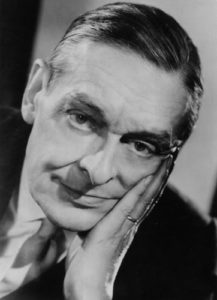Steve Horwitz and I have been teaching an online class about economics and literature, pairing core economic concepts with literary works that demonstrate those concepts. This past week, we talked with the students about opportunity cost (see Steve’s thoughts on Buchanan’s Cost and Choice here), using Thomas Grey’s “Ode on the Death of a Favorite Cat, Drowned in a Tub of Goldfishes” and T.S. Eliot’s “Love Song of J. Alfred Prufrock” as our literary texts.
Using poetry, I told the students, helps us think about opportunity costs in ways that travel alongside, but are not the same, as the ways that economists think about them. For economists, the important thing is that a choice is made. In the most reductive version of this, the moment of choice, the moment where opportunity costs are weighed, disappears into something called “revealed preference.” A choice is made. Results follow. The economist moves on. For poets, particularly for Eliot, and particularly in “Prufrock,” the moment of choice, the weighing of opportunity cost, is everything.

“The Love Song of J. Alfred Prufrock” is five pages of glorious poetry about the moment when we decide that a choice must be made, but we are caught on the tenterhooks of opportunity cost. The poem begins with the speaker inviting himself and us to walk out into the evening with him as he contemplates a life-altering decision. Although the nature of the decision is never directly stated, most readers agree that he is debating whether or not to ask someone to marry him. He decides not to, and the poem ends. The most reductive economic reading of the poem would be to say “Revealed preference. He never wanted to propose marriage anyway. He obviously got what he wanted, because otherwise he would have chosen something different. End of story.”
Horwitz describes James Buchanan as seeing, not “homo economicus” but “richly understood humans who experience that agony of choice and face uncertainty about the future.” This is certainly true when one contrasts Buchanan to the simple predictive choice economics models. But when one has the expansive playing field poetry offers for thought and exploration, there can be even more to the story than Buchanan gives us.
With “Prufrock,” we are invited to travel “you and I” alongside one particular human as he grapples with one particular decision. While Prufock is absolutely considering opportunity costs, his decision process is no sterile totting up of pros and cons followed by a simple choice of the least costly option.
There will be time, there will be time
To prepare a face to meet the faces that you meet;
There will be time to murder and create,
And time for all the works and days of hands
That lift and drop a question on your plate;
Time for you and time for me,
And time yet for a hundred indecisions,
And for a hundred visions and revisions,
Before the taking of a toast and tea.
Opportunity cost, for Prufrock, means a torturous understanding that choices define who we are. Every choice requires that we remake ourselves and “prepare a face” that goes with whatever choice we make. Choices “murder and create” different selves we might be and different lives we might lead. With all that hanging in the balance, no wonder Prufrock finds time “for a hundred indecisions/ And for a hundred visions and revisions.”
The unrelenting “should I/shall I” constructions of Eliot’s verse help us feel each of those individual moments that make up this thing we call a “choice.” And for Prufock, the actual choice passes almost unnoticed amidst all this debate. “I have seen the moment of my greatness flicker…in short, I was afraid.”
But while most economists would say “That’s the end of the story. Choice made. Preference revealed, moving on,” and while even Buchanan would say “A choice has been made and that experience will carry forward into Prufrock’s future choices,” Eliot shows us that–despite the fact that a choice has been made–the moment of choice is not over for Prufrock. Prufrock, human that he is, cannot stop thinking about it. Indeed, he still seems to be living in that moment of choice.
The poem’s “should I/ shall I” constructions transform into the phrase “would it have been worth it” as Prufrock returns obsessively to the moment of choice, thinking over what he could have done, might have done, did not do. The choice is made, but Prufrock is still endlessly, obsessively making it. The pain of Eliot’s poem comes not only from his obsessive titivating, but from his final realization that he has trapped himself in a world of unending “decisions and revisions,” growing ever older, but never wiser, and cutting himself off from the wonder and beauty he might have found through other choices.
Economists aren’t wrong to shrink the moment of choice to near invisibility. Poets aren’t wrong to expand it until it is so large it might “disturb the universe.” They are using different sets of tools to explore the same questions. We are wrong to think that using only one set–whichever set it is–gives us the real story.


READER COMMENTS
SaveyourSelf
Jul 1 2020 at 1:31pm
This is similar to describing the difference between a data point and a sample summary of data points in statistics. The data point has a great deal of information associated with it. The statistical summary loses most of the information in the data points in order to look for simple patterns that make the massive amount of information in all the data points more understandable. Statistics and science often times deliberately or unintentionally gives off the impression that they convey more information than the subjects they study, but this is mostly the opposite of truth. It sounds like James Buchanan was aware of that association. This might be another way to conceive of opportunity cost. The point of choice/action is the moment that the person becomes a data point. Prior to that she is all possibilities.
nobody.really
Jul 1 2020 at 1:43pm
On choices and opportunity cost in literature:
In Les Miserable, Fantine is dismissed from her job at Jean Valjean’s factory because it was discovered that she had a child out of wedlock. Unable to secure other employment, she turns to prostitution and eventually dies. Jean Valjean feels responsible for her plight—but why? He was not the only employer in the world; did he owe her some greater duty than any other employer? Moreover, the fact that she was fired, not laid off, suggests that the factory had room for another worker; presumably the factory hired some other person, thereby rescuing THAT person from a life of destitution. Why should Valjean (and, by implication, the reader) care more about Fantine than about the other worker?
Sarah Skwire
Jul 1 2020 at 4:32pm
Adam Smith would say that Jean Valjean cares more about Fantine than about an anonymous worker simply because she is not an anonymous worker. He has met her. He knows her. She is in a closer “sphere of sympathy” than workers he has not met.
nobody.really
Jul 2 2020 at 4:03pm
Doubtlessly so. And Frédéric Bastiat would note that this kind of reasoning draws an unjustified distinction between what is seen and what is not seen.
By definition, we care about those who are within our “sphere of sympathy.” The question remains, why should our spheres exclude those whom we logically know to exist, even if we have not met them?
This illustrates one of the mechanisms underlying structural racism/classism/etc.: We intervene to help those within our spheres of sympathy–to the exclusion, or even subordination, of others. The more powerful we are, the more we can intervene. Thus, those who happen to make the acquaintance of the powerful systematically enjoy protections that others do not. This system perpetuates whatever social hierarchy exists.
In contrast, Jesus of Nazareth urged people to love their neighbor–and when asked for clarification, offered an example of a member of a rival and despised tribe–Samaritans–extending compassion to a complete stranger. He seemed to espouse a sphere of sympathy that did not discriminate on the basis of acquaintance.
Alan Goldhammer
Jul 1 2020 at 4:10pm
I was infatuated by Prufrock for a while in college. While the economic interpretation Sarah presents is interesting, for public choice I find that Dr. Seuss’s ‘Green Eggs and Ham’ is more appropriate (as well as understandable) for this current era.
I could also make a claim for Rilke’s ‘Duino Elegies’ but its layered meaning is often obtuse but perhaps if one is looking at German poems of the 20th century, Celan’s Todesfuge is more apt for pandemics.
Sarah Skwire
Jul 1 2020 at 4:30pm
For teaching public choice through literature, I like to use the opening scene of Henry V, or the novel “The Pushcart Wars.”
MarkW
Jul 1 2020 at 5:28pm
It seems to me that analyzing life-altering decisions in terms of opportunity cost and revealed preference doesn’t work very well at all. The problem is that the value of one choice will be revealed only over a period of time (perhaps a very long one) while the value of the options not chosen will forever remain unknown. The choice doesn’t really reveal a preference for this over that, since at the time it’s made, there’s no way to know the true value of this, and you’ll never know the value of that. The choice is not a preference so much as a prediction (my best guess is that this will probably turn out better than that in the long run, but I’ll never be sure).
nobody.really
Jul 2 2020 at 9:25am
Perhaps “analyzing life-altering decisions in terms of opportunity cost and revealed preference” is under-specified.
On what basis do people make choices? We can’t know. Indeed, it’s unclear how well we understand our own motivations, let alone understand anyone else’s. But we can observe the choices people actually make, and those observations can help us infer the factors that influence the choices.
I agree, people’s choices may well reflect their predictions–and there are problems with saying that a person’s choice reflects a preference for a given OUTCOME rather than for a given PREDICTED OUTCOME. Most people who choose to become professional entertainers/athletes will achieve modest financial success in their careers. It does not follow that they revealed a preference for modest financial success, because they may have made their choices based on a prediction of greater financial returns.
Of course, other people make choices based only on very short-term (and reliable) considerations, discounting long-term consequences. This explains the outcome of most diets. And most of us combine considerations of short-term and long-term predictions.
Nevertheless, people DO choose, even in the face of uncertainty. And their choices reveal their preferences–even if it reflects only the preferences of the moment. But if you want to understand (and perhaps influence) choices, you want to understand those preferences of the moment. In the grand scheme of things, those momentary preferences are the ones that matter.
nobody.really
Jul 2 2020 at 12:32pm
Or, to be more literary, consider C.S. Lewis’s Screwtape Letters (1941), letter 29, describing dynamics that promote cowardice:
“The point is to keep [the soldier] feeling that he has something … to fall back on, so that what was intended to be a total commitment to duty becomes honeycombed all through with little unconscious reservations. By building up a series of imaginary expedients to prevent ‘the worst coming to the worst’ you may produce, at that level of his will which he is not aware of, a determination that the worst shall not come to the worst. Then, at the moment of real terror, rush it out into his nerves and muscles and you may get the fatal act done before he [realizes it]. For remember, the act of cowardice is all that matters….”
Comments are closed.